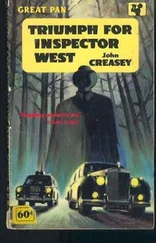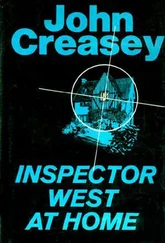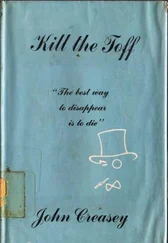John Creasey - Send Superintendent West
Здесь есть возможность читать онлайн «John Creasey - Send Superintendent West» весь текст электронной книги совершенно бесплатно (целиком полную версию без сокращений). В некоторых случаях можно слушать аудио, скачать через торрент в формате fb2 и присутствует краткое содержание. Жанр: Старинная литература, на русском языке. Описание произведения, (предисловие) а так же отзывы посетителей доступны на портале библиотеки ЛибКат.
- Название:Send Superintendent West
- Автор:
- Жанр:
- Год:неизвестен
- ISBN:нет данных
- Рейтинг книги:3 / 5. Голосов: 1
-
Избранное:Добавить в избранное
- Отзывы:
-
Ваша оценка:
- 60
- 1
- 2
- 3
- 4
- 5
Send Superintendent West: краткое содержание, описание и аннотация
Предлагаем к чтению аннотацию, описание, краткое содержание или предисловие (зависит от того, что написал сам автор книги «Send Superintendent West»). Если вы не нашли необходимую информацию о книге — напишите в комментариях, мы постараемся отыскать её.
Send Superintendent West — читать онлайн бесплатно полную книгу (весь текст) целиком
Ниже представлен текст книги, разбитый по страницам. Система сохранения места последней прочитанной страницы, позволяет с удобством читать онлайн бесплатно книгу «Send Superintendent West», без необходимости каждый раз заново искать на чём Вы остановились. Поставьте закладку, и сможете в любой момент перейти на страницу, на которой закончили чтение.
Интервал:
Закладка:
One party with their prisoner was going towards the house, the other was looking for Roger in the wrong place. Grant him just a little luck, and he would get away. A little more still, and he would find a telephone and get help, bring a rescue party to the house in time to save the boy, perhaps catch Gissing.
How had that alarm been raised?
The grounds might be ringed with a trip-wire; or a gate protected with an alarm. Did it matter? Someone had blundered into the alarm system, and been caught; it didn’t seem to matter who. Roger quickened his step, sure that there was no immediate danger. He could no longer hear the men who were seeking him.
He could see much better now. Another row of trees was facing him; the trees seemed to grow completely round the grounds with the house built in a clearing. It was downhill, here — the big disadvantage was that he didn’t know what the ground would be like a few steps ahead. There was a danger of running round in circles, too. He mustn’t hurry, he must keep his bearings.
There were no stars.
He looked for a light, other than the lights at the house and those from the flashlights, but saw nothing. He had his back to the house, and the glow from that would shine for a long way, if he kept his back to it he could at least be sure that he was getting farther away.
The trees were thinning.
The ground was even but slippery with pine-needles; he couldn’t go too fast. The immediate danger was past, but any mistakes now could damn him. If he were taken back, he wouldn’t find a smooth-voiced Gissing, he would find a devil.
He kicked against something that struck his ankle, and then heard a sound — a long way off, like the ringing of a bell. It went on and on. He glanced over his shoulder. The flashlights had stopped moving towards the house. He felt sweat breaking out. This was the trip-wire, the alarm had gone off again. He hadn’t a knife, couldn’t break it. He didn’t try, but began to run along it, then realized that if the wire ran round the clearing, they wouldn’t know whereabouts it had been touched again. He climbed over, and ran on.
Were there guards?
He had taken it for granted that everyone in the grounds had gone towards the man who was now a prisoner, but he must not take that or anything else for granted.
He stopped running, and now and again looked over his shoulder. The light from the house fell away to a dim glow, well above him, and the hillside was much steeper. Twice, he nearly pitched forward. The trees were all about him. He looked round again, and the light had vanished, but by going downhill he could be sure that he was getting farther away. His legs felt stiff and heavy, his back ached and his head throbbed. He hadn’t been aware of any of that at first, now he had time to think of it; and it became an obsession — that, and the need for keeping out of the way of the men who would be searching. If he had any idea where to go, it would have given him hope, but this was an unknown wilderness. There was no light anywhere, only the greyness of the sky and the darkness of the trees.
He stumbled on.
He didn’t know how long the transition took, but after a while he stopped thinking clearly, stopped being afraid of pursuit, somehow dragged one foot in front of the other and made himself go forward. He had no watch. He had no sense of time. Now his whole body ached, every muscle seemed to groan in protest. There was a sharp pain at the back of his right foot, another where he had kicked against the wire, but he knew that he must go on, and clung to that, forcing his feet to carry him farther. After a while, he knew that he would soon have to stop, that it would soon be impossible to keep moving. Each leg seemed like a leaden weight. The sharper pains were worse. His head now throbbed as badly as it had done after the blow at “Rest”. His mouth was wide open and he was gasping uncontrollably.
The hillside was behind him, he was on level ground now. Gradually he became aware of something different, as if his feet were being clawed back into the earth. He had taken a dozen floundering steps before he realized that he was walking through marshland That set a new conscious fear flaring into his mind. Marshes — bog. God! Where was he? Why didn’t he come to a road?
He didn’t come to a road.
He came to a clearing in the trees. A long way off there was light — light of all colours, tiny bars of green and blue and red and yellow. So far off that they were as far away as the stars. He stopped and swayed, putting one hand against a tree for support, then leaned against the tree. Water was up to his ankles. He studied the lights, and slowly the truth dawned. This was a lake. The patch of treeless darkness ahead was the smooth surface of the water. On the other side, miles away, was a village.
He was still breathing through his mouth.
He made himself think. The lights seemed to be directly opposite him, but he couldn’t judge which was the quicker way round. Right or left? He could turn in the wrong direction and never get there. This might be one lake or a string of lakes. There was no means of telling, he had to take a chance. So, woodenly, he turned right.
Sand and water were underfoot. He could hear the soft rippling of the water, which was cold at first, and slowly became icy. Trees grew right to the water’s edge nearly everywhere, now and again they receded and he could walk on dry ground, but the stretches were never long. The lights seemed to be just as far away, and he was haunted by the fear that this lake would run into another, and that he couldn’t reach that village. There was no light in front of him, no gleam that offered hope.
He came to a clearing.
He took Gissing’s gun from his pocket, went a few feet away from the water and plodded on, but tremors ran through his legs, they wouldn’t support him much longer.
A pain stabbed so sharply that he called out, and paused.
It would be easy to stop, to sit down, to stretch out, to rest. He longed to make the sand of the water’s edge a couch. He stared downwards all the time, and yet he didn’t see the boat. .He kicked against it, barked his shin, and fell. The gun dropped from his hand and plopped into water; was lost for good. A tree-stump? A rock? A fallen branch? He looked, and saw the dark outline of the small boat — long, canoe-like. The handle of a paddle stuck up.
He thought dully: “A boat. A boat: He turned his head to stare at the inviting lights. Were they nearer or further away?
He had a boat.
He saw something that seemed to grow out of the calm water; a small landing-stage. A boat and a landing-stage meant that someone often came here, might live here. He turned his head slowly, and made out the shape of a building, not big, but standing dark and solid against the trees. A building, but no light.
He turned towards it, less acutely conscious of the burden of his body. He did not expect to find anyone here. The door would be locked and the windows securely fastened — unless whoever lived here was asleep. He called out, but his voice was only a croak. He called again, and knew that it would be difficult to hear the sound more than a few yards away. He reached the side of the building, and banged, but had no strength to thump. The walls seemed to echo.
No one spoke, nothing happened.
He moved towards the left, where the hut faced the lake, and kicked against steps which led — where else could they lead? — to a front door. There was no rail. He mounted the steps unsteadily. The door faced him, he pushed, and the door opened.
That was so unlikely, that he stopped swaying drunkenly, hand stretched out, door creaking as it swung away from him. An age passed before he stepped up, and into the hut. It was darker here than it had been outside. That ordeal had ended in an empty hut and a canoe he hadn’t the strength to use, but he could rest. He must rest. There would be a chair, surely there would be a chair.
Читать дальшеИнтервал:
Закладка:
Похожие книги на «Send Superintendent West»
Представляем Вашему вниманию похожие книги на «Send Superintendent West» списком для выбора. Мы отобрали схожую по названию и смыслу литературу в надежде предоставить читателям больше вариантов отыскать новые, интересные, ещё непрочитанные произведения.
Обсуждение, отзывы о книге «Send Superintendent West» и просто собственные мнения читателей. Оставьте ваши комментарии, напишите, что Вы думаете о произведении, его смысле или главных героях. Укажите что конкретно понравилось, а что нет, и почему Вы так считаете.












